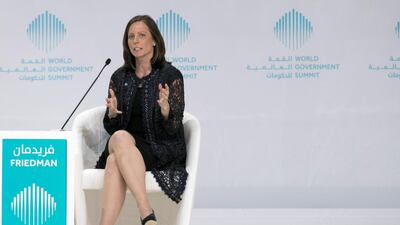Big companies such as global oil and gas major Saudi Aramco that can attract significant amounts of liquidity to markets may benefit from dual listings, the chief executive of Nasdaq said.
"I think any company, where you're looking at an event of that size, the amount of liquidity coming in, means you can support a dual listing, it doesn't mean you have to do one," Adena Friedman told the World Government Summit in Dubai on Monday.
Her comments came amid speculation as to where state-owned Aramco, the world's biggest crude producer, would list its shares when it launches an initial public offering in the second half of this year. A number of global financial exchanges including Nasdaq are vying to host Aramco's listing as it prepares for an estimated $100 billion share float on Saudi Arabia's Tadawul and a yet unspecified international bourse.
“Generally, it depends on the size of the company, the size of the float, the amount of liquidity they’re putting into the market and where they would list," said Ms Friedman. She declined to comment on talks for potential Aramco listing.
Dual-listing in the same time zone generally does not have a huge amount of benefit, as opposed to listings in different time zones, which allows for different liquidity pools to develop as investors wake up in different parts of the world, she said.
When asked about the advantages Nasdaq offers to attract a potential float like Aramco,Ms Friedman said the exchange is already home to the four largest companies in the world - Microsoft, Apple, Google and Cisco.
"Over the last year we've had over $350bn of market capitalisation switch from the New York Stock Exchange to Nasdaq, and in the last decade it's been a trillion dollars, because companies want to be part of the future," she said. "They don't necessarily want to be part of the past. The idea that they can come to the Nasdaq and be associated with all the companies that are driving the future of our economy, that's very exciting."
Higher volatility in US stock markets over the past week was the result of "human emotion", she said. Market growth created higher risk of inflation, and investors feared the government will choose to increase interest rates faster.
______________
Read more:
Abu Dhabi's launch of short-selling set to attract big investors
S&P, Nasdaq begin new year on a bright note with record high closings
Nasdaq Dubai to launch futures on Adnoc Distribution, Emaar Malls
______________
The main US index, the Dow Jones Industrial Average, twice suffered 1000-point plunge last week, triggering a worldwide sell-off.
Regionally, Ms Friedman complemented the governments and regulators in the Arabian Gulf for overhauling their capital markets in recent years to increase transparency and attract more investors.
Governments are "doing a great job of developing a robust regulatory oversight that allows for fair trading," she told the summit delegates.
Nasdaq Dubai, the only regional bourse that offers derivatives trade, introduced futures in 2016, to draw foreign investors. Last October, it signed a licence agreement with the DFM, under which exchange futures contracts could be traded on Nasdaq Dubai's equity futures market.
Meanwhile, a host of regulations have been introduced by other GCC states to better regulate their capital markets.
“We are seeing a rapid, rapid advancement of the capital markets here in the region – in Dubai and Abu Dhabi as well as in Saudi Arabia – and I think that’s hugely beneficial not only to local investors but to international investors who are looking to get more involved in the stocks and instruments that are traded there,” she said.

